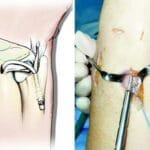Rephrased Paragraph:
Our hands play a crucial role in daily life, enabling us to eat, dress, write, work, play sports, create art, and perform countless other tasks. For optimal function, the hands need strength, mobility, and sensory feedback. When injury or dysfunction occurs, treatment must address all the tissues that contribute to hand function. Hand surgeons specialize in the care of the hand and upper limb, with backgrounds in orthopedic, plastic, or general surgery. These specialists often manage conditions affecting the fingers, hands, wrists, forearms, and elbows, helping to restore function and alleviate discomfort.
Rephrased Content
What Specialized Training Do Hand Surgeons Undergo?
Hand surgery is a highly specialized field pursued by orthopedic, plastic, and general surgeons. To become a qualified hand surgeon, professionals undergo the following steps:
- Complete an additional year of advanced training in hand surgery after their initial 5- to 7-year surgical residency.
- Focus a significant portion of their practice—often at least 70%—on treating conditions involving the hand and upper extremity.
- Obtain certification in hand surgery from a recognized medical board. For orthopedic surgeons, the American Board of Orthopaedic Surgery (ABOS) offers a Subspecialty Certificate in Orthopaedic Surgery of the Hand, which indicates advanced qualifications in hand surgery through extensive training and experience in handling diverse cases.
What Do Hand Surgeons Treat?
Hand surgery is a medical specialty focused on diagnosing and treating issues affecting the hand, wrist, and forearm, both surgically and non-surgically. Hand surgeons are trained to perform operations when needed and can also diagnose and manage conditions related to the elbow. Some specialize in treating either children or adults, while others manage patients of all ages.
Common conditions treated by hand surgeons include:
- Arthritis affecting the fingers, hand, or wrist
- Carpal tunnel syndrome
- Cubital tunnel syndrome
- Fractures in the fingers, hand, or wrist
- Ganglion cysts of the hand and wrist
- Infections of the hand and wrist
- Nerve injuries in the hand and wrist
- Tendon injuries in the fingers, hand, or wrist
- Trigger finger
For hand surgeons who also address elbow conditions, treatments may cover:
- Biceps tendon tears
- Elbow arthritis
- Dislocations and fractures of the elbow
- Lateral epicondylitis (tennis elbow)
- Medial epicondylitis (golfer’s elbow)
Specialists in pediatric hand surgery may also treat congenital hand differences.
Roles and Responsibilities of Hand Surgeons
Hand surgeons manage both surgical and non-surgical cases, typically splitting their time between:
- The operating room, where they perform procedures to correct issues requiring surgery.
- The clinic or office, where they treat non-operative conditions, prepare patients for surgery, and conduct follow-up care.
In academic settings, hand surgeons may also train medical students, residents, and fellows, engage in research, publish articles, and present at medical conferences.
Rephrased Content
Why Should You Visit a Hand Surgeon?
If you experience pain in your fingers, hand, wrist, elbow, or arm, or have concerns related to the upper extremity, consulting a hand surgeon is advisable. Hand surgeons specialize in diagnosing, treating, and managing hand-related conditions, dedicating a significant portion of their practice to hand and upper extremity care, making them experts in this field.
What to Expect During a Visit to a Hand Surgeon
A typical consultation with a hand surgeon usually involves the following steps:
- Medical History: The surgeon will begin by asking questions about your symptoms and the history of your condition to gain a comprehensive understanding of your concerns.
- Physical Examination: A focused physical exam will be conducted on the affected area of your upper extremity.
- Diagnostic Imaging: The surgeon may recommend X-rays during your visit to assess the bones in your hand or wrist. Additional diagnostic tests such as nerve studies, CT scans, MRIs, ultrasounds, or other imaging may be ordered if more information is needed for an accurate diagnosis or treatment plan.
Nonsurgical Treatment Options Recommended by Hand Surgeons
Hand surgeons often explore nonsurgical treatments before considering surgery. These options may include:
- Hand Therapy: This form of rehabilitation combines physical and occupational therapy to improve mobility and alleviate pain in the hand and wrist.
- Injections: Steroid injections are frequently used to treat various hand and wrist conditions and can be administered in the office.
- Medications: Depending on the condition, prescription or over-the-counter medications, such as nonsteroidal anti-inflammatory drugs (NSAIDs), may help reduce symptoms.
When Surgery Is Necessary
If nonsurgical treatments are ineffective or the condition requires urgent intervention, surgery may be recommended. The urgency of surgery depends on the condition; for example, fractures or infections might need immediate attention, whereas elective procedures like those for carpal tunnel syndrome or arthritis can be scheduled at a later date.






